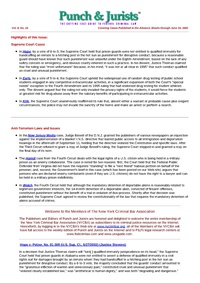Loaded on
June 1, 2002
published in Punch and Jurists
June 10, 2002
Ten days after the terrorist attacks of September 11, 2002, Chief Immigration Judge Michael Creppy issued a memorandum (the “Creppy Memo”) to all immigration judges and court administrators, informing them that the Attorney General had implemented a number of security procedures for certain deportation cases in the Immigration Court. …
Loaded on
June 1, 2002
published in Punch and Jurists
June 10, 2002
District court erroneously departed downward in sentencing defendant after a drug conspiracy conviction, where departures for factual circumstances (defendant's criminal history, diminished capacity, and disparity of other suspects' sentences) were inappropriate as a matter of law.
This case is noted for its detailed discussion of the differences between …
Loaded on
June 1, 2002
published in Punch and Jurists
June 10, 2002
Here, the Fifth Circuit addressed a Government appeal of Judge Gilmore's award of damages resulting from the IRS' unauthorized disclosures of the plaintiff's confidential tax information (reported at 91 F.Supp.3d 1014). The Fifth Circuit remanded the case for further findings, particularly on the issue of whether the taxpayer was …
Loaded on
June 1, 2002
published in Punch and Jurists
June 10, 2002
Here the Court affirmed the grant of a summary judgment motion in favor of a law firm sued by former clients in a criminal case, holding, inter alia, that the retention of a retainer after the firm was discharged did not constitute unjust enrichment.
In this case, former …
Loaded on
June 1, 2002
published in Punch and Jurists
June 10, 2002
In an era when exceptions and inroads to the sanctity of the Fourth Amendment’s protections have become commonplace, this brief per curiam order shows that the Supreme Court at least recognizes that there still is “a firm line drawn at the entrance of the house.”
Here, police officers entered …
Loaded on
June 1, 2002
published in Punch and Jurists
June 10, 2002
Here the Court held that, on some issues, the Guidelines replace a sentencing judge's reasoning about a defendant's past conduct and his future likelihood of recidivism; and here the court crossed that line in a manner that required resentencing.
Although it will be extremely difficult to pinpoint the …
Loaded on
June 1, 2002
published in Punch and Jurists
June 10, 2002
Here the Court held that the Federal Public Defender did not have a sufficiently significant relationship with a detainee, captured as an alleged enemy combatant during military operations in Afghanistan, to establish "next friend" standing.
This case deals with the legal rights of one of the growing number …
Loaded on
June 1, 2002
published in Punch and Jurists
June 10, 2002
In this case, by a vote of 5-to-4, the Supreme Court upheld the validity of a suspicionless drug testing policy enacted by a School Board in rural Oklahoma that requires all students who participate in competitive extracurricular activities to submit to random drug testing. In a decision that focused …
Loaded on
June 1, 2002
published in Punch and Jurists
June 10, 2002
Although the mandatory detention of deportable aliens is reasonably related to legitimate government interests, the 14-month detention of a deportable alien, convicted of firearm offenses, constituted punishment without the benefit of a trial in violation of due process.
Recently, a number of courts have begun to question the constitutionality …
Loaded on
June 1, 2002
published in Punch and Jurists
June 10, 2002
In a decision that Justice Thomas claims will “turn[ ] qualified immunity jurisprudence on its head,” the Supreme Court held that prison guards in Alabama were not entitled to assert a defense of qualified immunity in a civil rights suit for damages brought by an inmate whom they had …
